
The festival brought together architects, developers, urbanists, investors, cultural figures, and city residents — more than 3,500 guests spent the day in discussions, networking, excursions, and the atmosphere of a big city celebration.
Among the main events of the festival were:
◽️ Panel discussions in four halls — from investments in renovation and revitalization to the future of urban infrastructure;
◽️ Presentation of the new issue of DMNTR magazine;
◽️ Excursions to sites from leading developers;
◽️ A gala evening with a performance by Yevgen Khmara and a jazz band featuring Oleksiy Kogan.
Comments from participants:
Oleksiy Baranov: how city spaces are being rebooted
The general sponsor of the festival was Oleksiy Baranov, CEO of A Development. He participated in a professional interview entitled “Restoration and revitalization as an act of rebooting space” and conducted an exclusive tour of the A-Station space for partners and speakers.
Read the full interview with Oleksiy Baranov – https://share.google/pILaOIoTySJK96KGE
“Concept and location are two factors that drive real estate. We must create projects that change the face of the city and make Kyiv a modern European capital,” the developer emphasized.
Pavlo Somov: Restorative infrastructure is about people
EcoBud Building Group founder Pavlo Somov took part in two key discussions:
“Reconstruction through the eyes of a developer: is it profitable to invest in the restoration of the old city?”
“Restorative infrastructure: investment in restorative social infrastructure as a driver of sustainable urban development.”
“Restorative infrastructure starts with people. It’s not just buildings or parks, but above all, human potential, the ability of society to regenerate and create new spaces.”
Roman Ivanenko: Architecture of trust instead of fences
Roman Ivanenko, managing partner of Urban Development Group (UDG), presented the project “Architecture of trust: a park instead of a fence” and shared his experience of working on revitalization and new residential complexes.
“I want there to be no more fences around residential complexes in Kyiv. Fences do not provide security; they separate. If we build a city with fences, it will no longer be a city.”
One of the key themes of the festival: How has the demand for new buildings changed?
“Today, the key criterion for customers is confidence in the developer and their ability to deliver projects on time. In times of turbulence, trust becomes the decisive factor,” emphasized Boris Tsomaia, marketing director at RIEL.
The festival brought together key ideas about the future of cities:
◽️ Renovation and revitalization are the main tools for creating new value in abandoned properties.
◽️ Veteran spaces are becoming a priority in restoration — from rehabilitation centers to venues for entrepreneurship and community.
◽️ The investment attractiveness of urban projects directly depends on partnerships between business, communities, and government.
◽️ Development and architecture must work for people, creating sustainable and inclusive solutions.
Panel discussion: “Renovation. Revitalization: developers’ investment strategies for the future of cities”
Key points:
◽️ A new approach to urban development — developers face difficulties due to limited mechanisms for interacting with authorities, even when they have good ideas.
◽️ Revitalization “for the soul” — there are projects that are interesting to implement even without economic benefits.
◽️ Lack of urban planning policy — developers are ready to build, renovate, and restore, but are waiting for the right rules of the game.
◽️ Investment mechanisms — traditional instruments are high-risk, and there is no infrastructure for tokenizing assets. Legislative changes could significantly boost investment.
◽️ Cities after the war — the war may encourage the state to change its attitude toward urban planning.
◽️ An example of successful urban development — Vinnytsia has demonstrated effective cooperation between architects, the municipality, and the mayor.
◽️ The dream of a cultural project in Podil — the elevator could become a hotel and cultural center, similar to Silo in Cape Town.
September Fest 2025 proved that Ukraine’s new urbanism is emerging at the intersection of architecture, culture, economics, and lively dialogue.
Tel.: 044 461 91 28
www.ubc-ua.info/september-fest
Organizer: DMNTR
General Sponsor: A | DEVELOPMENT
About us:
DMNTR Media Group is a team with 25 years of experience in creating professional events for the architecture, construction, and investment audience. Our key projects include: Ukrainian Construction Congress, Ukraine Investment Congress,
All-Ukrainian Interior of the Year competition, Ukraine Urban Awards, and Creator of the Year architecture and development award.
We also publish the leading architecture and design magazine DMNTR and actively develop social media, where we publish daily insights, news, reports, and photo reports from all our events.
Link to the photo report – www.ubc-ua.info/september-fest
Follow us:
Instagram: www.instagram.com/ukrainian_building_congress
Facebook: www.facebook.com/share/16RUuTVCQ1
Interfax-Ukraine – information partner
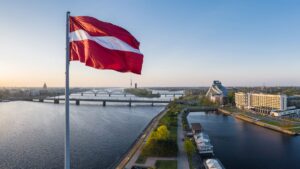
The overwhelming majority of Ukrainians have a positive attitude towards Latvia, which indicates a consistently high level of sympathy for this country. These are the results of a sociological survey conducted by Active Group in collaboration with the Experts Club analytical center.
According to the results, 72.7% of respondents rated Latvia positively (41.0% — completely positive, 31.7% — mostly positive). A neutral attitude was expressed by 21.3% of respondents, while only 5.3% declared a negative position (2.3% — completely negative, 3.0% — mostly negative). Only 0.7% of respondents said they had no information about this country.
“The survey results show an extremely high level of trust and sympathy among Ukrainians towards Latvia. This country is perceived not only as a political ally, but also as a partner that consistently supports Ukraine in the international arena,” said Alexander Pozniy, head of Active Group.

In turn, Maksim Urakin, co-founder of Experts Club, drew attention to the economic indicators of bilateral trade.
“According to the results of the first six months of 2025, trade turnover between Ukraine and Latvia reached $263.9 million. Ukrainian exports amounted to $154.2 million, while imports amounted to $109.7 million.
The positive balance amounted to more than $44.5 million, which favorably distinguishes Latvia among Ukraine’s other trading partners in the EU,” the expert emphasized.
Thus, Ukraine and Latvia not only maintain a high level of mutual sympathy, but also demonstrate balanced and mutually beneficial trade and economic cooperation.
The full video can be viewed at: https://www.youtube.com/watch?v=YgC9TPnMoMI&t
You can subscribe to the Experts Club YouTube channel here: https://www.youtube.com/@ExpertsClub
ACTIVE GROUP, BALTIC STATES, EXPERTS CLUB, LATVIA, Pozniy, SOCIOLOGY, TRADE, UKRAINE, УРАКИН

A survey conducted by Active Group in collaboration with Experts Club in August 2025 revealed an exceptionally high level of positive sentiment among Ukrainians toward Sweden.
According to the results, 76.3% of respondents expressed favor toward this country: 41.3% rated it mostly positively, and another 35% rated it completely positively. A neutral position was taken by 21.3% of respondents, while negative assessments were minimal — only 2.3%.
“Ukrainians see Sweden as an example of stable democracy, a socially oriented state, and one of the most consistent allies in supporting Ukraine. This explains why this country is among the leaders in terms of positive perception,” emphasized Alexander Pozniy, head of Active Group.
At the same time, Maxim Urakin, co-founder of Experts Club, drew attention to the economic aspect.

“Despite the extremely high level of sympathy, trade between Ukraine and Sweden remains rather modest. At the end of the first half of 2025, bilateral trade amounted to only $418 million. Exports from Ukraine amounted to about $41 million, while imports of Swedish goods exceeded $376 million. This resulted in a significant negative balance of over $336 million. This means that Ukraine has the potential to intensify cooperation, especially in the fields of mechanical engineering and woodworking, where Sweden is one of the world leaders,” he stressed.
Thus, Sweden combines a high level of public support with new economic opportunities for Ukraine.
The full video can be viewed at:
You can subscribe to the Experts Club YouTube channel here:
ACTIVE GROUP, EXPERTS CLUB, Pozniy, SOCIOLOGY, SWEDEN, TRADE, UKRAINE, URAKIN
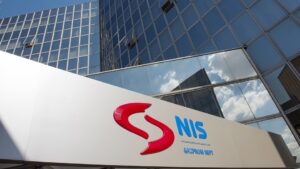
According to Serbian Economist, Serbian NIS has again submitted a new request to the US Treasury Department to extend a special license allowing it to postpone the full application of sanctions and continue the company’s operations after September 26, 2025, when the previous permit expires.
According to the company, the request was sent on September 18. Earlier, on March 14, NIS also sent a request to the US agency to be removed from the SDN (Specially Designated Nationals) list, but this process is lengthy and complicated.
Since 2022, the application of sanctions against NIS has been postponed six times on the basis of special licenses issued by the Office of Foreign Assets Control (OFAC) of the US Department of the Treasury.
Serbian President Aleksandar Vučić, in an interview with Blic TV, expressed concern that further delays may not follow.
“I am afraid that there will be no more delays and we will find ourselves in an extremely difficult situation,” he said.
According to Vučić, during his visit to the US, including a meeting with Secretary of State Marco Rubio, he intends to seek help in resolving this issue.
NIS is Serbia’s largest energy company, controlled by Russia’s Gazprom Neft (56.15%) and the Serbian government (29.87%). The company accounts for the lion’s share of oil refining and fuel production in the country, owns a network of more than 400 gas stations in Serbia and neighboring countries, and plays a key role in the region’s energy security.
Any restrictions against NIS directly affect the Serbian fuel market, state revenues, and transit links in the Balkans, making the issue of sanctions critically important for both Belgrade and the whole of Southeast Europe.
Source: https://t.me/relocationrs/1439

The results of a study conducted by Active Group and Experts Club in August 2025 showed that Ukrainians generally have a favorable attitude toward Taiwan, although a significant portion of respondents remain neutral.
Thus, 41.0% of respondents expressed a positive attitude (12.0% – completely positive, 29.0% – mostly positive). Only 7.7% gave negative assessments, while almost half — 49.0% — took a neutral position, and 2.3% admitted to being insufficiently informed about this country.
“Taiwan is perceived quite evenly in Ukrainian society, without any strong emotions. At the same time, the positive significantly outweighs the negative, which indicates the general open attitude of Ukrainians towards this important player in the global economy,” said Alexander Pozniy, head of Active Group.
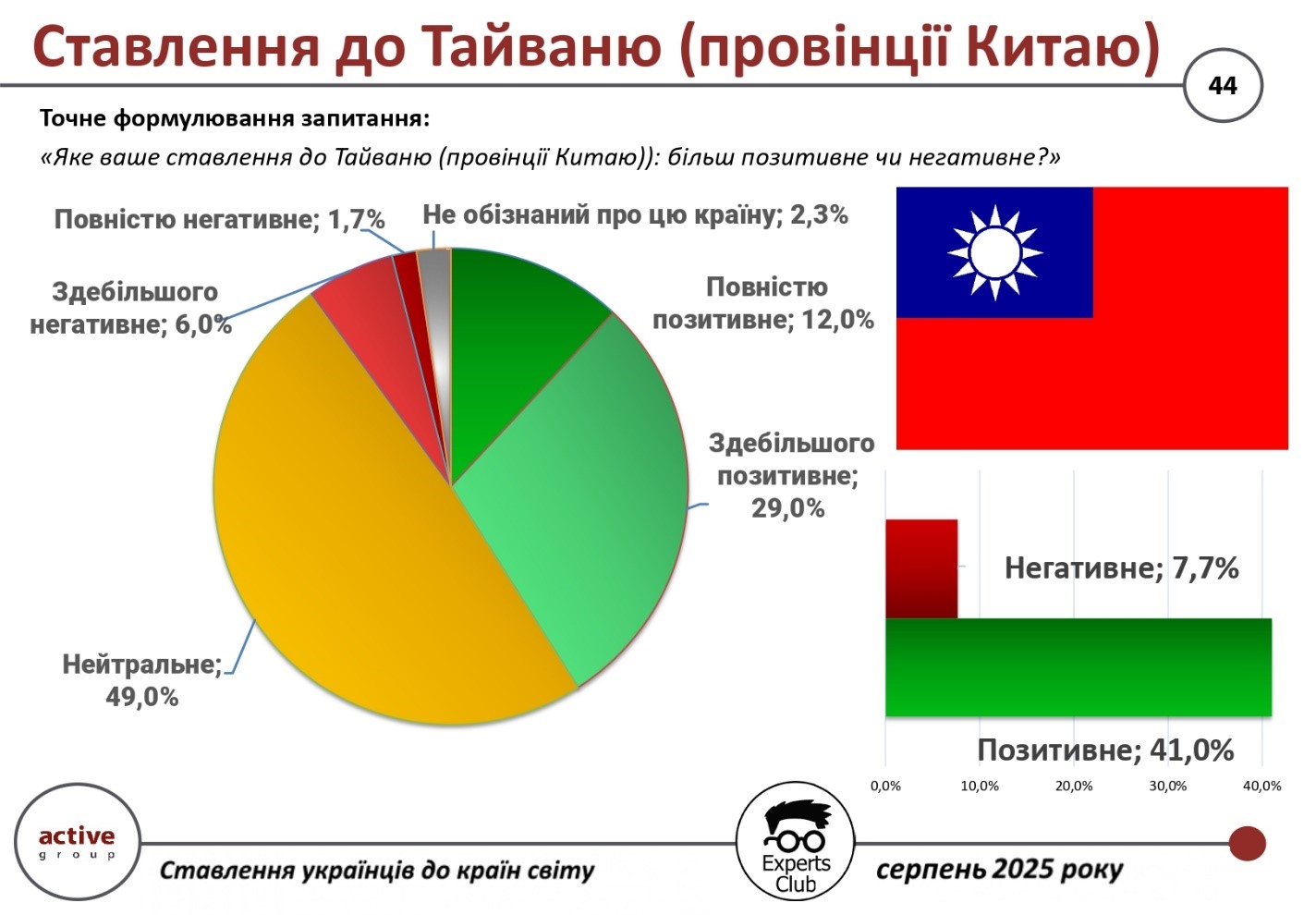
Maksim Urakin, founder of Experts Club, noted that there is a significant imbalance in trade and economic relations between Ukraine and Taiwan:
“According to the results of January-August 2025, trade turnover amounted to about $262.1 million. At the same time, exports from Ukraine amounted to only $8.8 million, while imports from Taiwan amounted to more than $253.3 million. As a result, the negative balance exceeded $244.6 million. This indicates the weak representation of Ukrainian goods on the Taiwanese market,” he said.
Thus, Taiwan occupies an important place in Ukraine’s foreign economic relations, but mainly as a supplier of high-tech goods.
The full video can be viewed at: https://www.youtube.com/watch?v=YgC9TPnMoMI&t
You can subscribe to the Experts Club YouTube channel here: https://www.youtube.com/@ExpertsClub
ACTIVE GROUP, ASIA, EXPERTS CLUB, Pozniy, SOCIOLOGY, TAIWAN, TRADE, UKRAINE, УРАКИН
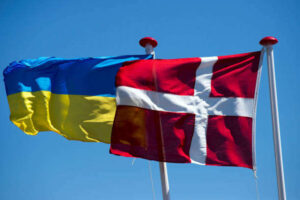
The results of a survey conducted by Active Group and Experts Club in August 2025 show that Ukrainians have a very favorable attitude towards Denmark.
Thus, 73.7% of respondents expressed a positive attitude (33.3% — completely positive, 40.3% — mostly positive). Only 1.3% of respondents gave negative assessments, while 22.7% took a neutral position and 2.3% admitted to being insufficiently informed about the country.
“Denmark is perceived by Ukrainians as a sincere partner and reliable ally in the current circumstances. The high level of trust reflects both humanitarian aid and consistent political support for Ukraine from Copenhagen,” said Active Group CEO Oleksandr Pozniy.
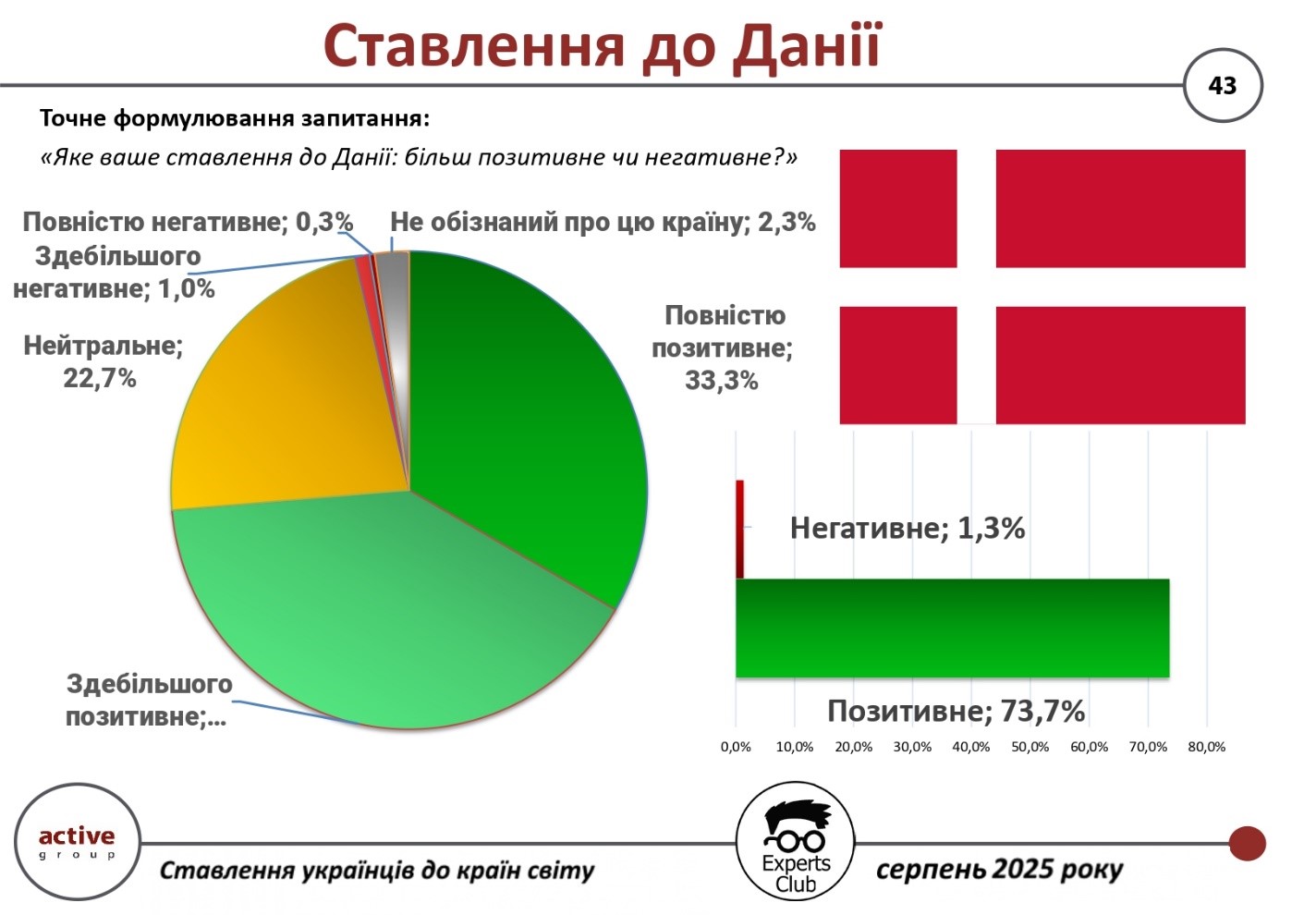
Maksim Urakin, co-founder of Experts Club, analyzed trade and economic indicators:
“According to the results of January-August 2025, trade turnover between Ukraine and Denmark amounted to about $279 million. Exports of Ukrainian goods reached $109.3 million, while imports from Denmark exceeded $169.6 million. As a result, there was a negative balance of $60.3 million. This indicates that, despite very warm public sentiment, Ukraine should work to strengthen its exports to the Danish market,” the expert emphasized.
Thus, Denmark remains one of the most positively perceived countries among Ukrainians, but the economic component of relations requires more balanced development.
The full video can be viewed at: https://www.youtube.com/watch?v=YgC9TPnMoMI&t
You can subscribe to the Experts Club YouTube channel here: https://www.youtube.com/@ExpertsClub
ACTIVE GROUP, DENMARK, EU, EXPERTS CLUB, Pozniy, SOCIOLOGY, TRADE, UKRAINE, УРАКИН